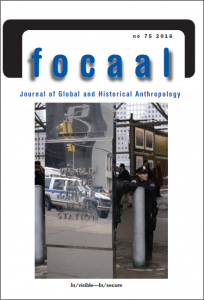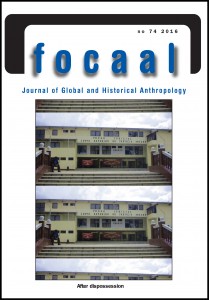The European Union is a free trade area that enables multinational corporations to take advantage of low tax regimes for their head offices and of low labor costs for their manufacturing, caller center, and human resources operations. It forces countries to pay off the debt owed to private banks at the cost of democracy, jobs, pensions, welfare benefits, and economic stability (let alone growth), enabling public subsidy of private risk. It blocks entry to migrants risking their lives to come and work in Europe, or to escape war and poverty in their countries of origin. Why would anyone support a vote for Britain to Remain?
All posts by Focaal Web Editor
Karen Sykes: The estranged citizens of Brexit
It was political
16 June 2016
I first heard the BBC Radio 4 announce the death of the Labour MP for the Spen Valley, West Yorkshire while I was driving along the A62 from Manchester, where I work, to the Colne Valley, where I live. My commute follows an ancient trade route that crosses the fold of the Pennines at Standedge Edge to enter the West Riding, a political region still known as West Yorkshire, even today with its multicultural cities of Leeds, Halifax, Bradford, and Huddersfield. The county is an interlocking series of valleys running east and west, in which large derelict textile mill sites cast long shadows along the same canals and roads that once carried their products away to the rest of the world. In the previous year on the occasion of her first address to the UK Parliament, the MP had called up West Yorkshire’s history, which was her own history:
Continue reading
Alessandro Zagato: Teachers struggles and low intensity warfare in the south of Mexico
The teachers’ campaign in defense of public education and against the neoliberal reforms being introduced by the Mexican government has ignited a new cycle of social struggles and an outbreak of violent repression in Mexico. This short article was written from within the barricade/encampment of San Cristobal de Las Casas (Chiapas), where, for nearly two weeks, organized teachers together with a supportive heterogeneous population are blockading the highway to Tuxtla Gutierrez—the state’s capital. The encampment of San Cristobal is one of the dozens of blockades that have been set up over the last few weeks all across the country.
Douglas R. Holmes: No Exit: London, July 2016
I arrived in London on 10 July, a few weeks after the Brexit referendum. I was in Parliament the following day—the day Theresa May was named the new prime minister.
Reading about the situation is one thing; dealing with it ethnographically is another. I have no idea how to proceed, nor do I trust my initial observations. So this post with its provisional assertions should be read with circumspection.
Continue reading
Polina Manolova: Brexit and the production of “illegal” EU migrants
Bulgarians on their way to the “West”
EU immigration was the primary source of contention in the debates surrounding the recent referendum about the United Kingdom’s EU membership. The “leave” campaign continuously bombarded the public with warnings about “uncontrollable hordes” of EU benefit seekers (for a discussion on the construction of migrant categories, see Apostolova 2016) planning to permanently settle for the “easy” life in the UK and take away the jobs of the locals. Likewise, the “remain” campaign promised to crack down on the number of immigrants and further restrict the rights of newcomers. In this way, both camps reinforced the perception that immigration from the EU, and in particular from eastern Europe, is a problem. Furthermore, in their effort to make the case for a “remain” scenario, academic voices tirelessly demonstrated the economic, cultural, and demographic benefits of EU migration. Such efforts, however well intended, still feed into an instrumentalist policy perspective that constructs migrants’ lives as only important in terms of their added value for the local economy.
Continue reading
Katharina Bodirsky: The UK voted out: Some reflections on European “unity in diversity”
Against the predictions of the last polls, a narrow majority of the UK voters decided to leave the EU. Once again, the political crisis of Europe has deepened. And once again, it does not seem as if this deepening of the crisis will force a fundamental reorientation of the “European project.”
In the following, I take issue with a mainstream framing of the crisis as one engendered by an atavistic nationalism that haunts the cosmopolitan present of Europe, a framing that directs attention away from the class character of European state-making of the past decades. If the EU is not to disintegrate, however, the latter has to be challenged.
Continue reading
Focaal Volume 2016, Issue 75: In/visible—In/secure
 We are pleased to announce that the latest issue of Focaal – Journal of Global and Historical Anthropology has recently published and is available online at its new home, www.berghahnjournals.com/focaal.
We are pleased to announce that the latest issue of Focaal – Journal of Global and Historical Anthropology has recently published and is available online at its new home, www.berghahnjournals.com/focaal.
Zoë Goodman: What’s the point of the “Mauss haus”? The Gift and anthropology today
On 30 April 2016, a group of anthropological heavyweights congregated at the School of Oriental and African Studies (SOAS, University of London), under the aegis of a workshop entitled “The gift that keeps on giving.” The workshop, organized to launch Jane Guyer’s expanded edition of Marcel Mauss’s The Gift (2016), brought into being the third English translation of this much-cited text. As the latest offering from open-access publishing house HAU Books, the event also marked the start of a partnership between HAU and the SOAS Centre for Ethnographic Theory (CET).
Continue reading
Mariya Ivancheva: The revolution will not be criticized? The (im)possibility of left-wing critique in Venezuela
This post is part of a series on the Latin American pink tide, moderated and edited by Massimiliano Mollona (Goldsmiths, University of London).
After heading the pink tide in Latin America, the Bolivarian government in Venezuela has most recently experienced significant challenges (Bolton 2016). With oil prices sinking, inflation skyrocketing, and consumption goods chains being blocked by commercial networks sympathetic of the opposition, the government has started losing support in its base. Gloating over power cuts and “food shortages”—or more accurately, deficits of certain consumables—opposition-supporting international and Venezuelan private media are hysterically preparing for a pyrrhic victory of the free market over socialism. Scandalized by ever-stronger reactions against Dilma Rouseff’s presidency in Brazil, Venezuelan government supporters home and abroad take an ever more defensive stance shielding the government from internal and external critique alike.
Continue reading
Focaal Volume 2016, Issue 74: After dispossession
 We are pleased to announce that the latest issue of Focaal – Journal of Global and Historical Anthropology has recently published and is available online at its new home, www.berghahnjournals.com/focaal.
We are pleased to announce that the latest issue of Focaal – Journal of Global and Historical Anthropology has recently published and is available online at its new home, www.berghahnjournals.com/focaal.
This issue’s theme section, titled “After dispossession” and guest edited by Oscar Salemink and Mattias Borg Rasmussen, addresses how seemingly global processes become entangled in local affairs in sub-Saharan Africa, a former Soviet republic, and Latin America. The editors’ introduction is available to all readers for free, and “Reclaiming the lake” is also temporarily free as a part of Berghahn’s Earth Day virtual issue.
Focaal 74 also includes a regular articles section and a forum piece by FocaalBlog’s very own Edward Simpson. As always, forums are freely available to all readers.
Volume 2016, Issue 74: After Dispossession
Guest Editors: Oscar Salemink and Mattias Borg Rasmussen
THEME SECTION
After dispossession: Ethnographic approaches to neoliberalization
Oscar Salemink and Mattias Borg Rasmussen
Reclaiming the lake: Citizenship and environment-as-common-property in highland Peru
Mattias Borg Rasmussen
Infrastructures of progress and dispossession: Collective responses to shrinking water access among farmers in Arequipa, Peru
Astrid Oberborbeck Andersen
Enemies of the people: Theorizing dispossession and mirroring conspiracy in the Republic of Georgia
Katrine Bendtsen Gotfredsen
Foregrounding possibilities and backgrounding exploitation in transnational medical research projects in Lusaka, Zambia
Birgitte Bruun
ARTICLES
“Communists” on the shop floor: Anticommunism, crisis, and transformation of labor in Bulgaria
Dimitra Kofti
Humanitarian mine action in Burma/Myanmar and the reterritorialization of risk
Ken MacLean
It was horrible, but we live now: The experience of young German adults in everyday encounters with the Holocaust
Lisa J. Krieg
FORUM
Is anthropology legal? Earthquakes, blitzkrieg, and ethical futures
Edward Simpson
Recommend Focaal to your library
As a key researcher in your field, you can recommend Focaal to your library for subscription. A form for this purpose is provided on the Focaal website here.